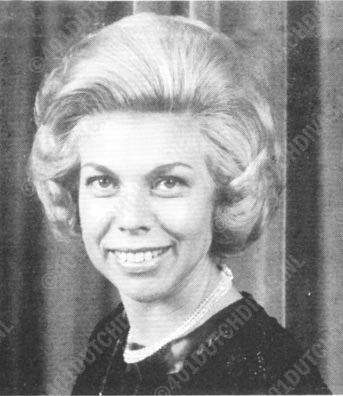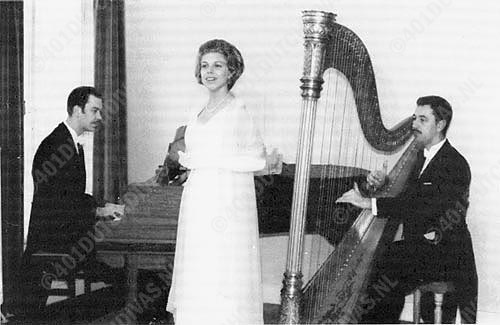Karin Ostar

Karin Ostar, soprano
Karin Ostar - born in The Hague - followed her singing study at the Koninklijk/ Royal Haags Conservatorium and studied afterwards for some years with Nelly Vertrecht.
In 1957 she received at the Internationale Vocalistenconcours 's-Hertogenbosch the Toonkunst/ Music Vocalistenprijs; four years later - in 1961 - she captured one of the first prizes. This was the start of a career, on which she mainly focused to the oratorio repertoire.
On the radio Karin Ostar sang - also under the name of Vera Kranz - in various promenade concertos and shortened operetta versions.
She also appeared together with Magda Olivero in her Vara-concertos and with the ensemble Arpa-Triada, consisting of Karin Ostar, pianist Rudy de Heus and founder harpist Edward Witsenburg. This unusual trio debuted in the spring of 1967 in the Hague' Diligentia. She also sang the soprano part in the, by order of the Johan Wagenaarstichting/ foundation composed Vijf / Five Boutonsliederen of Rudy de Heus for mixed choir, soprano solo and string orchestra on May 13th 1969 in the Goede Vrijdagkerk/ Good Friday Church at the Hague. Karin Ostar sang also in the school opera De prinses op de erwt, together with Henk van de Brink, Nico Boer and Nell Veelo. This opera was composed by Hans Schouwman, likewise by order of the Johan Wagenaarstichting and performed in 1965 under auspices of the Haagse Kunstkring/ Hague Art circle.

The Arpa-Triada
from left to right Rudy de Heus, piano, Karin Ostar and Edward Witsenburg, harp
Karin Ostar made her opera debut at the Nederlandse Operastichting on October 17th 1958 in Die Fledermaus. She sang the tiny role of Ida. Further she sang in 1960 as Jano in Jenufa, in 1960 now as Adèle in Die Fledermaus and on May 25th 1973 as Marguerite in Faust by Gounod in the Stadsschouwburg/ City Theater of Tilburg. To these few performances her opera career was limited.
Karin Ostar made several gramophone records, a.o. together with the Mastreechter Staar under the baton of Martin Koekelkoren.
source: a.o. Rudi van den Bulck/ Frans van Dijck; Mens en Melodie
Léhar, Das Land des Lächelns, Wer hat die Liebe uns ins Herz gesenkt, duet together with Willy Caron, tenor.




